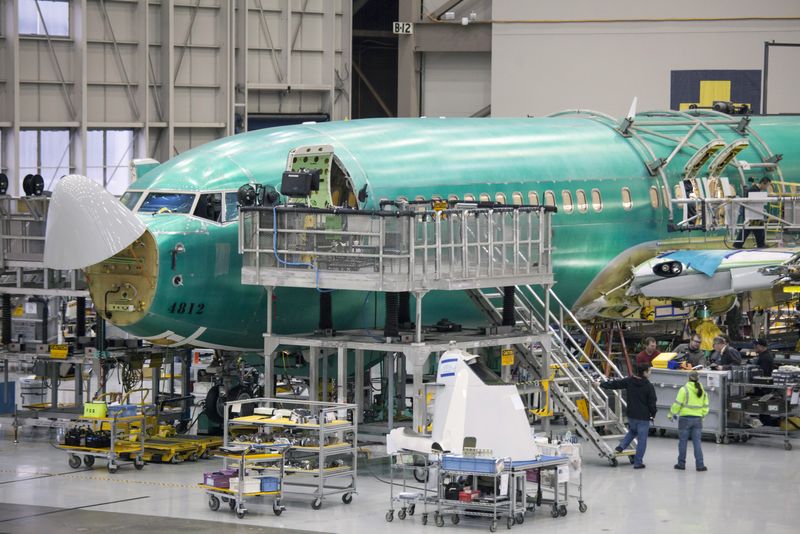By Valerie Insinna and Tim Hepher
(Reuters) - Boeing (NYSE:BA) has delayed plans for its supply chain to ramp up production of its bestselling 737 jetliner, according to a presentation seen by Reuters, as the company deals with regulatory curbs on its output and increased scrutiny following a mid-air blowout on a MAX 9 in January.
The U.S. Federal Aviation Administration in late January barred Boeing from increasing production of the 737 MAX following the Jan. 5 accident, and could prove a setback in the future as the U.S. planemaker struggles to raise production levels to compete with its European rival Airbus.
Boeing was not immediately available for comment.
According to Boeing's latest 737 supplier master schedule seen by Reuters, the supply chain was previously told to inrease production rates from the equivalent of 38 aircaft a month to 42 in February this year which is now delayed to June.
Boeing will push back a rate increase from 47 jets a month from August 2024 to January 2025.
A move to 52 737s per month scheduled for February 2025 is now estimated to take place in June 2025, a timeline that would allow Boeing to stay on track for its goal of producing 50 jets per month in 2025-2026, a critical enabler for achieving $10 billion in free cash flow in the same timeframe.
Boeing won't hit its pre-pandemic goal of 57 aircraft per month until February 2026, from a previous estimate for August 2025.
The supplier master schedule lays out the expectation for when suppliers should be at a given production rate. While it usually predates Boeing's own shift to a new rate, it is an important signal of confidence for the supply chain, who rely on it for planning future workforce and equipment investments.
It also comes as Boeing is in talks to buy back its former subsidary Spirit AeroSystems (NYSE:SPR), the Wall Street Journal reported Friday, as the Wichita-based company has also dealt with substantial production delays and hits to its balance sheet.
Boeing leaders had indicated the supply chain would keep ramping up according to previous plans issued in December, but acknowledged there could be future changes due to an ongoing FAA audit of Boeing's production system.
Boeing has said its 737 production line in Renton, Washington, is nominally operating at a rate of 38 jets per month. However, the actual output is lower, as the company has had to periodically pause the line to address quality issues, Chief Financial Officer Brian West said last month.
West said then that maintaining the master schedule from December will force Boeing to carry extra inventory and contribute to a cash usage in the first quarter of 2024, but it would also allow suppliers to stay stable and cut the likelihood of production defects that previously hampered ramp up plans.
Some suppliers had privately questioned whether Boeing would maintain its previous master schedule if the production freeze extended past a couple months, while others raised concerns that small and medium sized businesses could find themselves in financial straits after making costly capital investments in anticipation of higher production.
The FAA has not indicated what criteria Boeing will need to meet to be approved for future production rate increases. Earlier this week, FAA administrator Mike Whitaker told Boeing CEO Dave Calhoun that the company would have 90 days to develop a plan to address quality issues.

Boeing expects to ramp up to an actual production rate of 38 737s a month in the second half of they year, "but it will be dictated by the regulator," West said last month.
Airbus is producing about 50 single-aisle jets per month, Reuters previously reported, and its CEO said in February the company is on track to reach a key production target of 75 narrowbody jets per month in 2026.